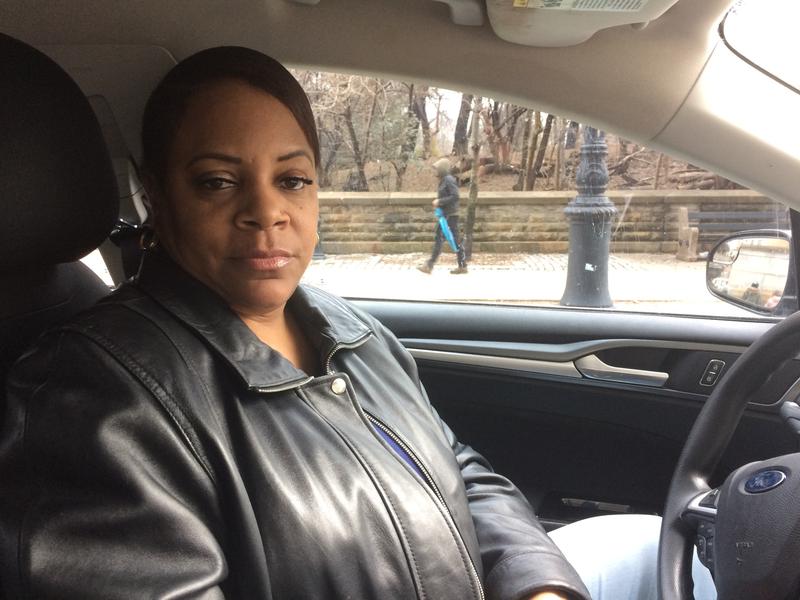
NYPD Traffic Enforcement Agent Sokunbi Olufemi was directing traffic in Long Island City at the foot of the Queensboro Bridge. "And this guy, I told him to stop but he didn't want to stop," he recalled. "He spit at me and then drove over the bridge." The driver added a racial slur — a common punctuation to the workday for the city's more than 3,100 ticket agents, who are almost entirely people of color.
Olufemi didn't catch the car's license plate number so he decided to let it go. Besides, his experience as vice president of the traffic agents' union had taught him that, on the rare occasion a driver winds up in court, not much happens to discourage future abuse.
"They only get a slap on their wrist," Olufemi said. "This makes the public attack us more, because they know they're not going to go to jail."
Olufemi and the union are backing a bill in the State Assembly that would enhance the power of traffic agents by upgrading their status and pay to that of peace officers. Despite their NYPD uniforms and white hats, traffic agents are civilians — not peace officers, like cops — and don't get the same protections. For example, a man sucker-punched an agent in Staten Island last October and knocked him out cold. The assailant was charged with misdemeanor assault and harassment — charges that would most likely have been felonies had the agent been a peace officer.
State Assemblyman Peter Abbate said he heard multiple accounts of abuse at the hands of the public at a meeting of traffic agents last year. "One gentleman came over and told me his story," the assemblyman said. "Then a second heard what he was saying and chimed in, 'Hey yeah, that's true.' And then another one was like, 'Come here. Tell him what happened to you.'"
Abbate said it made him realize, "basically all of their work is confrontational." He decided to sponsor a bill upgrading the status of traffic agents, which might gain them more respect.
But City Hall disagrees.
“We are opposed to this legislation because it places unnecessary administrative burdens on the NYPD while doing little to improve traffic safety," said mayoral spokesman Seth Stein in a statement to WNYC. He added that the mayor's road safety priorities are speed cameras and the mandatory reporting of medical conditions that could cause a driver to lose consciousness, which may have been the cause of a recent crash in Park Slope that killed two children and seriously injured their mothers.
"These are the proposals we will be working with the legislature to enact this session,” Stein said.
A spokesperson for the NYPD said traffic agents, "play a vital role in supporting the department’s efforts to reduce injuries and fatalities on our streets and keep New Yorkers and visitors safe." But then went on to say that granting peace officer status to traffic agents "would place a resource strain on the department."
In other words, it would cost too much to give traffic agents extra training and raise their salaries.
The union counters that argument with two numbers: the 8 million tickets its members write per year, and the nearly $1 billion they bring in revenue to the city. Sokumbi Olufemi says, for that, traffic agents deserve a boost to their $36,000 starting salary. As peace agents, they'd be paid more like a police officer: $44,000 to start, with increases at a much higher rate than under their current pay structure.
The Assembly bill would also give agents the power to ticket moving violations. The union contends the move would immediately add more teeth to Mayor Bill de Blasio's Vision Zero traffic safety program. (As of now, agents are only allowed to write tickets for illegal parking and blocking the box.) The mayor himself regularly speaks of ticketing as an essential tool to curb bad driving habits. "If you're forgetting to yield to a pedestrian and cutting off a pedestrian, you may get that ticket," he said in a speech last year.
Olufemi and his union would like NYPD traffic agents to write those tickets. Right now, if he's directing traffic in an intersection and telling drivers not to make a left turn, there are always those who know there's just no penalty for ignoring him. "They say, 'What are you going to do to me?' They just make a left turn. They want to run you over."
Agents tell stories of drivers purposely side-swiping them or mashing their feet with the wheels of their car. And then there's what happened to Wanda Scott, who was violently attacked by an irate motorist after writing him a ticket for double-parking.
She made a narrow escape but ended up with wrist, neck and knee injuries. The experience has her rooting for the bill, which is now in committee, to be passed. And she's hoping it will bring with it some overdue respect.
